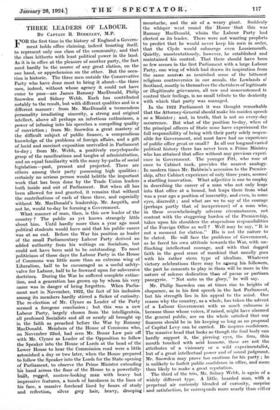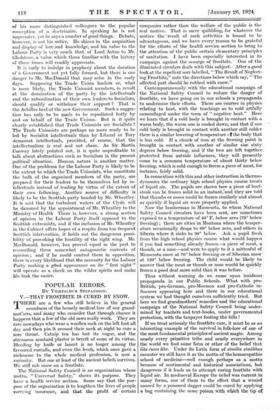THREE LEADERS OF LABOUR.
BY CAPTAIN R. BERKELEY, M.P.
VOR the first time in the history of England a Govern- ment ment holds office claiming, indeed boasting itself, to represent only one class of the community, and that the class hitherto with least political power in the land. As it is in office at the pleasure of another party,, the fact need hardly be. the source of any great elation, on the one hand, or apprehension on the other. But the occa- sion is historic. The three men outside the Conservative Party who have done most to bring it about—the three men, indeed, without whose agency it could not have come to pass—are James Ramsay MacDonald, Philip Snowden and Sidney Webb. Each has contributed notably to the result, but with different qualities and in a different manner : from Mr. MacDonald a tremendous personality irradiating sincerity, a strong and original intellect, above all perhaps an infectious enthusiasm, a power of infusing into his speeches a compelling quality of conviction ; from Mr. Snowden a great mastery of the difficult subject of public finance, a compendious knowledge of, the problems of .foreign affairs, and a gift of lucid and succinct exposition unrivalled in Parliament to-day ; from Mr. Webb, a positively encyclopaedic grasp of the ramifications and tangles of administration, and an equal familiarity with the mazy by-paths of social legislation—past, present and projected. There are others among their party possessing high qualities : certainly no serious person would belittle the important work that has been done by the 'Trade Union leaders both inside and out of Parliament. But when all has been allowed for and granted, it remains that without the contributions of each of these three, and especially without Mr. MacDonald's leadership, Mr. Asquith, and not he, would to-day be forming a Government.
What manner of man, then, is this new leader of the country ? The public as yet knows strangely little about him. Until hardly more than a year ago most political students would have said that his public career was at an end. Before the War his position as leader of the small Parliamentary Labour Party derived an added authority from his writings on Socialism, but could not have been said to be outstanding. To most politicians of those days the Labour Party in the House of Commons was little more than an extreme wing of Liberalism, half to be encouraged as a useful safety- valve for Labour, half to be frowned upon for subversive doctrines. During the War he suffered complete extinc- tion, and a generation has grown up by whom his very name was in danger of being forgotten. When Parlia- ment met in November, 1922,. the fact of his inclusion among its members hardly stirred a flicker of curiosity. The re-election of Mr. Clynes as Leader of the Party seemed a foregone conclusion ; but this was a new Labour 'Party, largely chosen from The intelligentsia, all professed Socialists and all or nearly all brought' up in the faith as preached before the War by Ramsay MacDonald. Members of • the House of CommOns who, on November 22nd, had seen Mr. Bonar Law pair off with Mr. Clynei as Leader of the Opposition to follow the .Speaker into the House of Lords at the head of the Lower House to hear the CoMmission read were a little astonished a day or two later, when the House prepared to follow the Speaker into the Lords for the State opening of Parliament, to observe the Prime Minister extending his hand across the floor of the House to a powerfully- built, rugged, austere-looking man with heavy but impressive features, a touch of harshness .in the lines of his face, a massive forehead lined by hours of study and reflection, silver grey hair, heavy, drooping moustache, and the air of a weary giant. Suddenly the whisper went' round the' House that this was • Ramsay MacDonald, vihilm the Labour Party had elected as its leader. There were not wanting prophets to predict that he would never keep his men in order, that the • Clyde would submerge even Lossiemontb. Quietly, unostentatiously, however, he established and maintained his control. That there should have been so few scenes in the first Parliament with a large Labour Party, one wing of which had drawn its inspiration from the same sours' s as nourished some of the bitterest religious controversies in our annals, the Lowlands ol Scotland, mostly in themselves the cherishers of legitimate or illegitimate grievances, all raw and unaccustomed to control their feelings, is no small tribute to the dexterity with which that party was managed.
In the 1922 Parliament it was thought remarkable that the Attorney-General should make his maiden speech as a Minister ; and, in truth, that is not an every-day occurrence. But what of the position to-day, when of the principal officers of State none have experienced the full responsibility of being with their party solely respon- sible for Government, and most have had no experience of public office great or small? In all our long and varied political history there has never been a Prime Minister who has attained that office without any previous experi- ence in Government. The younger Pitt, who rose at once to Cabinet rank, provides the nearest analogy.
In modern times Mr. Baldwin's accession to the Premier. ship, after Cabinet experience of only three years, seemed a startling innovation. What adjective is one to employ in describing the career of a man who not only leaps into that office at a bound, but leaps there from what was a year ago a position of insecurity, and even, in some eyes, discredit ; and what are we to say of the courage (perhaps partly that of inexperience) of a man, who, in these overwhelmingly adverse circumstances, not content with the staggering burden of the Premiership, takes upon his shoulders the stupendous responsibilities of the Foreign Office as well ? Well may he say, " It is not a moment for elation." His is not the nature to be elated. He will face the problems 'of Government, as he faced his own attitude towards the War, with un- flinching intellectual courage, and with that dogged faith in the good sense of mankind that usually goes with his rather stern type of idealism. Whatever victory celebrations there may be among his followers, the part he consents to play in them will be more in the nature of solemn dedication than of paean or partisan panegyric. " Not unto us the glory," he will say. , Mr. Philip Snowden can at times rise to heights of eloquence, as in his first speech in the last Parliament, but his strength lies in his appeal to the mind. One reason why the country, as a whole, has taken the advent of a Labour Government with so much calmness ' is because those whose voices, if raised, might have alarmed the general public, are on the whole satisfied that our finances should be in his keeping so long as no proposal of Capital Levy can be carried. He inspires confidence. The massive head that looks as though the frail body can hardly support it, the . piercing eyes, the firm, thin mouth touched with acid humour, these are not the attributes 'of a visionary or a wild experimentalist, but of a great intellectual power and of sound judgment. Mr. Snowden may prove too cautious for his part, ; he is unlikely to forfeit public confidence in office, and more than likely to make a great reputation.
The third of the trio, Mr. Sidney Webb, is again 'of a widely 'different type. A little, bearded man, with a perpetual air curiously blended of curiosity, surprise and satisfaction, he corresponds more nearly than' either of his more distinguished colleagues to the poplin:r conception of a doctrinaire. In speaking he is not impressive, yet he says a number of good things. Debate, liowever, is not his metier. He shines in the acquisition and display of lore and knowledge, and his value to the Labour Party is very much that of Lord Acton to Mr. Gladstone, a value which those familiar with the history of those times will readily appreciate.
It is early to indulge in prophecy about the duration of a Government not yet fully formed, but there is one danger to Mr. MacDonald that may arise in the early days. Supposing the Trade Union leaders or, what is more likely, the Trade Unionist members, in revolt at the domination of the party by the intellectuals and the subordination of their own leaders to Socialism, should qualify or withdraw their support ? That is the Achilles heel of the new Government. Such .a sugges- tion has only to be made to be repudiated hotly by and on behalf of the Trade Unions. But is it quite clearly established that Trade Unionists are Socialists ? The Trade Unionists are perhaps no more ready to be led by Socialist intellectuals than by Liberal or Tory democrat intellectuals, provided, of course, that the intellectualism is real and not sham. As Sir Martin Conway lately pointed out, it is quite unprofitable to talk about abstractions such as Socialism in the present political situation. Human nature is another matter. One of the problems for the Labour Party is likely to be the extent to which the Trade Unionists, who constitute the bulk of the organized members of the party, are prepared for their leaders to be themselves led by in- tellectuals instead of leading by virtue of the extent of their own following. Another source of difficulty is likely to be the Scottish party headed by Mr. Wheatley. It is said that the turbulent waters of the Clyde will be dammed by the appointment of Mr. Wheatley to the Ministry of Health There is, however, a strong section of opinion in the Labour Party itself opposed to the Scottish extremists, and if the inclusion of Mr. Wheatley in the Cabinet offers hopes of a respite from too frequent Scottish intervention, it holds out the dangerous possi- bility of provoking the hostility of the right wing. Mr. MacDonald, however, has proved equal in the past to reconciling these somewhat antagonistic currents of opinion ; and if he could control them in opposition, there is every likelihood that the necessity for the Labour Party making a gOod appearance on its " first night " will operate as a check on the wilder spirits and make his task the easier.



































 Previous page
Previous page